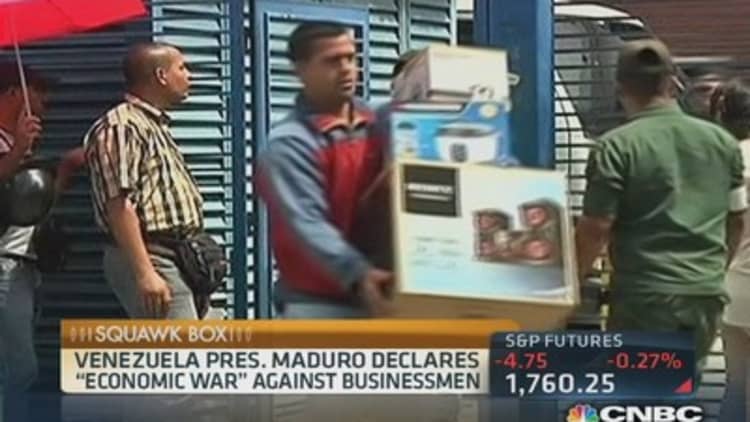Less than a year after the death of former dictator Hugo Chavez, Venezuela is on the verge of an economic breakdown. Inflation is soaring; the currency, the bolivar, is drastically losing value on the black market; and foreign currency reserves are dwindling. Even Venezuela's once vaunted energy sector, crippled by lack of investment, is failing to generate enough revenue to subsidize domestic giveaways.
"There is a difference between Venezuela and the rest of Latin America, which now has very solid macroeconomy fundamentals," Juan Pablo Fuentes, an economist at Moody's Analytics, told CNBC. "The macroeconomy for the last 20 years has been very mismanaged [in Venezuela]."
This month, hundreds of people across Venezuela clamored to get into electronics stores—some of them occupied by soldiers—after the government ordered merchants to cut prices. Soaring inflation has put appliances and other goods beyond the reach of most of the population. Rather than acknowledge what most experts agree is the role of governmental policies in causing rampant inflation, President Nicolás Maduro pointed the finger at retailers themselves.
Replicating the Chavez style, Maduro has blamed the private sector for the country's problems, and last week the government signed a decree capping profit margins and further tightening import regulations. His moves drew praise from supporters, but condemnation from critics of the government.
"You can't beat inflation by decrees but with sensible economic policies," the opposition coalition said in a statement.
Venezuelan officials in New York and Washington were unavailable for comment for this story.
Venezuela now runs a public sector deficit of about 15 percent of gross domestic product, according to Moody's. (In comparison, the U.S. federal deficit stands at 4.1 percent of GDP in 2013, down from 6.8 percent last year.)
Venezuela's GDP is close to $300 billion, if calculated according to the official exchange rate of 6.30 bolivars to the dollar. However, Fuentes said, the unofficial exchange rate, set by the black market, is closer to 50 bolivars to the dollar—a gigantic leap from January, when that rate stood at 17.30 to one.
The inflation rate soared to 58.5 percent in October, up from 21.4 percent at the end of 2012. That has prompted the state to expand price controls, and some economists see the problem getting worse.
"Venezuela might face triple-digit inflation by early next year," Fuentes wrote in a note.
As things stand, the country is running out of tools to prevent an extensive economic crisis. International currency reserves are at an eight-year low, falling 26 percent between the end of 2012 and mid-September, to $22 billion, he wrote.
In addition, China—Venezuela's main financier—has become stingier after "earlier loans to promote oil production failed to produce results," Fuentes said.
Meanwhile, Venezuelan bond yields are spiking. Yields on the country's 20-year benchmark bond have leaped more than 100 basis points this month, to 13.23 percent Monday from 12.15 percent at the end of October, according to Thomson Reuters.
Its oil-for-influence program, PetroCaribe, has also seen better times. The Chavez-era alliance was designed to unite several countries in the region, all of which were to receive oil from Venezuela on favorable terms.
But those conditions are changing. Guatemala said this month that it was pulling out of the program after Venezuela changed repayment terms for its oil bill. Other Latin American and Caribbean nations, including the Dominican Republic, have been hit with interest rate increases and heftier up-front payments.
(Read more: )
As Venezuela becomes increasingly dependent on Chinese credit, the Asian economic heavyweight can procure Venezuelan crude on far more favorable terms than the members of PetroCaribe ever did. China pays for only about half of the oil it gets from Venezuela; the other half covers the debt. No official numbers are available, but sources, including Fuentes, estimated that Venezuela's debt to China peaked at $35 billion to $40 billion, though part of that is believed to have been repaid.
Oil production at Petróleos de Venezuela (PDVSA) has declined from a peak of 3.5 million barrels a day to about 2.5 million barrels a day.
To maintain steady output, oil producers must consistently invest in shipping and pipeline capabilities, as well as in the broader supply chain, according to John Felmy, chief economist at the American Petroleum Institute.
"If they are not ready to make the investment, there will be a decline in production," he said. "If Maduro continues the policy of Chavez, it is not a good sign for Venezuela."
PDVSA did not respond to multiple inquiries from CNBC.
(Read more: )
Though Venezuela remains a net oil supplier to the U.S., its American oil imports almost tripled between 2007 and 2012, when the U.S. shipped 31.11 million barrels of oil and petroleum products there, according to the U.S. Energy Information Administration.
Venezuela's oil revenues cannot cover its mounting social spending and internal debt, experts say.
According to Felmy at API, the country has a problem similar to one faced by other Latin American countries. The state runs the oil companies, and its spending priorities often focus on public programs rather than on reinvesting in energy infrastructure.
That is true for PDVSA, the country's largest employer. The company last year spent billions of dollars on domestic social programs, said Pedro Palma, director of Ecoanalitica, a consulting firm in Caracas.

Venezuela's government also gives generous subsidies for gasoline, which in addition to consuming revenue provides an incentive for the black market. For example, a gallon of premium gasoline goes for 3 or 4 cents in Venezuela, while in Colombia the price is about $6.
"Imagine the huge business you can make just sending gasoline to Colombia," Palma said.
But like that of Chavez, the Maduro government gives little indication of changing its economic policy.
"The government is irresponsibly blaming the private sector for all the problems in the economy," Palma said. "We are on the verge of getting into a much deeper economic crisis."
—By CNBC's Anna Andrianova. Follow her on Twitter @AndrianovaAnna



